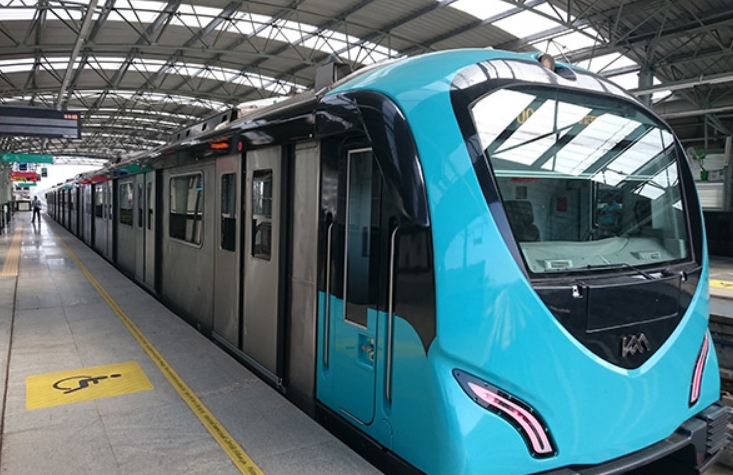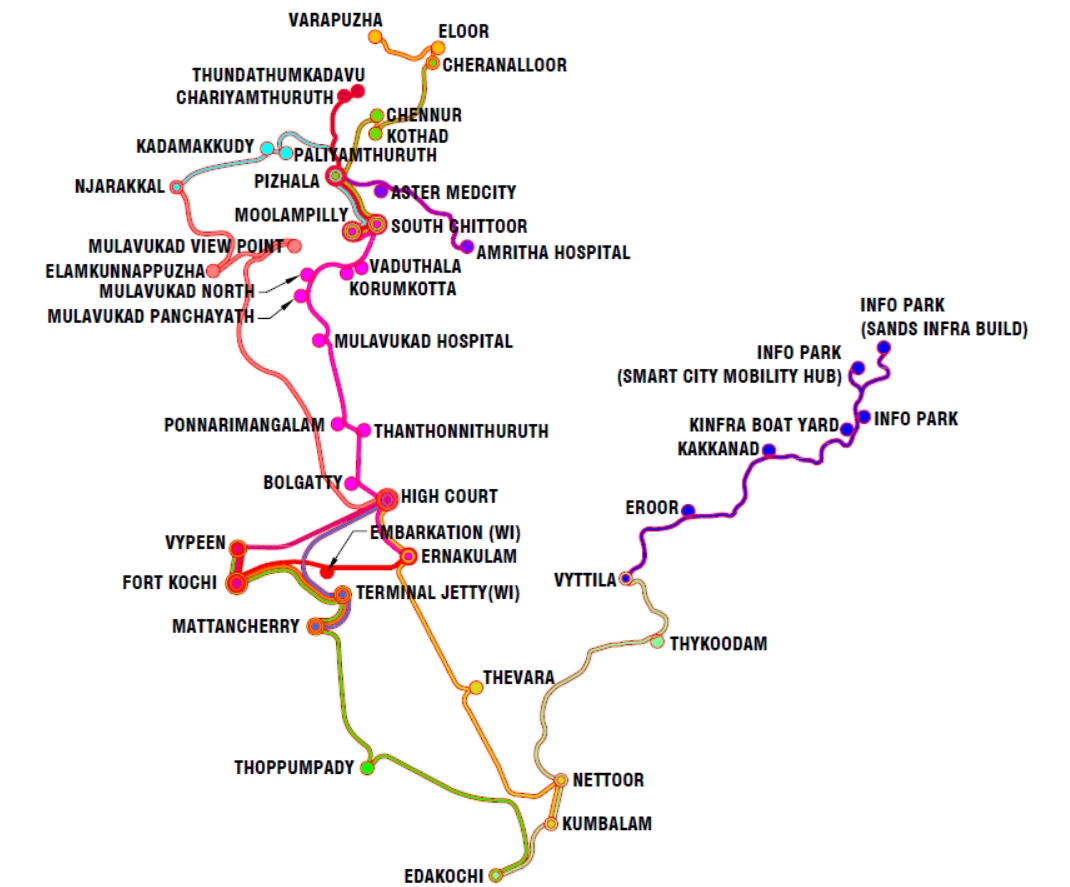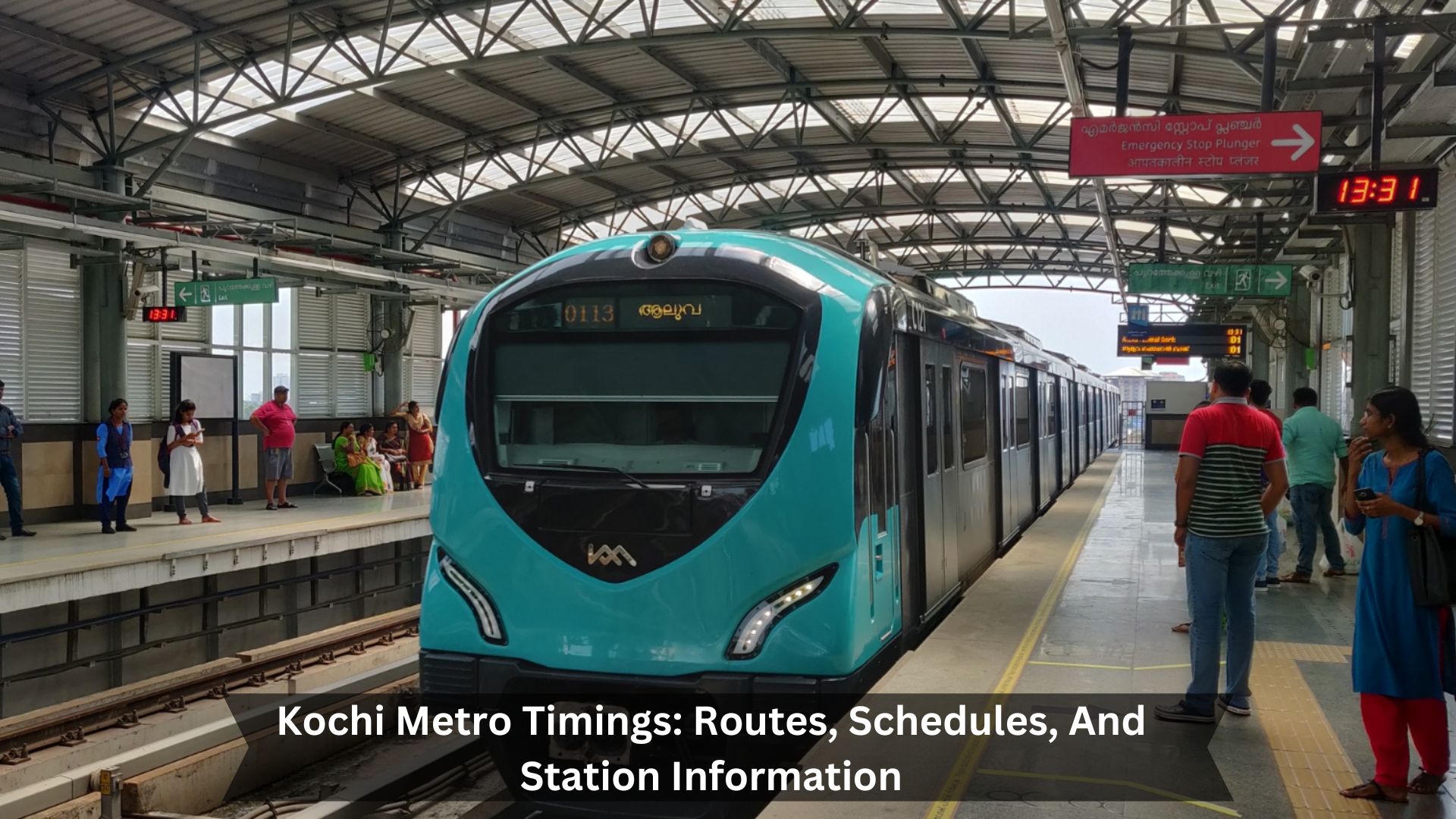Since its start, the Kochi Metro has changed the way people travel around the city. It connects essential places across Kochi, making it easier for everyone to get around. The Metro uses the latest technology, like driverless trains and high-tech signals, ensuring that trips are not only quick but also safe and comfortable.
It’s not just about getting from point A to point B; Kochi Metro also cares about the environment. Many of its stations use solar power, showing its dedication to keeping the city clean while helping people move around. This is a big step towards tackling the city’s traffic and pollution issues.
Kochi Metro Timetable
Weekday Timings

Kochi Metro runs at 6:00 AM and stops at 10:00 PM on weekdays. Trains often come to ensure everyone gets where they need to go on time.
During busy morning hours from 8:00 AM to 11:00 AM and in the evening from 5:00 PM to 8:00 PM, trains arrive every 7 minutes. When it’s less busy, the wait time goes up to about 10 minutes. This schedule helps people get to work or school without wasting time waiting for the train. Every station is open and follows this timetable.
Sunday Timings
On Sundays, the Kochi Metro starts later, at 8:00 AM, and runs until 11:00 PM. This change helps match the different travel needs people have on the weekend. It makes it easier for everyone, locals and visitors, to plan their day.
During busy times, trains come every 10 minutes. When it’s not so busy, they come every 15 minutes. Even with fewer trains, you can still get around quickly. If you’re planning to ride the Metro, checking the latest schedule is a good idea. You can find updates on the Kochi Metro website or app, especially if there’s a holiday or a significant event in the city.
See Also – Mumbai Metro: Map, Routes, And Timings – Everything You Need To Know
Kochi Metro Route Map and Stations

Phase I
Phase I of the Kochi Metro has 22 stations and runs from Aluva to Petta. It spans about 25 kilometers and mainly connects significant spots in the city.
For example, Edappally station is near one of the largest malls in Asia, and Kaloor station is close to the international stadium. The metro also links essential places like the Ernakulam Junction railway station and the Vyttila Mobility Hub, where different types of transport come together. This network makes daily travel easier, reduces traffic, and helps the city move towards more sustainable transport options.
| Station | First Train (From Aluva) | Last Train (From Aluva) | First Train (From Petta) | Last Train (From Petta) |
|---|---|---|---|---|
| Aluva | 6:00 AM | 10:00 PM | – | – |
| Pulinchodu | 6:02 AM | 10:02 PM | 6:58 AM | 10:58 PM |
| Companypady | 6:04 AM | 10:04 PM | 6:56 AM | 10:56 PM |
| Ambattukavu | 6:06 AM | 10:06 PM | 6:54 AM | 10:54 PM |
| Muttom | 6:08 AM | 10:08 PM | 6:52 AM | 10:52 PM |
| Kalamassery | 6:10 AM | 10:10 PM | 6:50 AM | 10:50 PM |
| Cochin Univ. | 6:12 AM | 10:12 PM | 6:48 AM | 10:48 PM |
| Pathadipalam | 6:14 AM | 10:14 PM | 6:46 AM | 10:46 PM |
| Edapally | 6:16 AM | 10:16 PM | 6:44 AM | 10:44 PM |
| Changampuzha Pk | 6:18 AM | 10:18 PM | 6:42 AM | 10:42 PM |
| Palarivattom | 6:20 AM | 10:20 PM | 6:40 AM | 10:40 PM |
| JLN Stadium | 6:22 AM | 10:22 PM | 6:38 AM | 10:38 PM |
| Kaloor | 6:24 AM | 10:24 PM | 6:36 AM | 10:36 PM |
| Lissie | 6:26 AM | 10:26 PM | 6:34 AM | 10:34 PM |
| MG Road | 6:28 AM | 10:28 PM | 6:32 AM | 10:32 PM |
| Maharaja’s | 6:30 AM | 10:30 PM | 6:30 AM | 10:30 PM |
| Ernakulam South | 6:32 AM | 10:32 PM | 6:28 AM | 10:28 PM |
| Kadavanthra | 6:34 AM | 10:34 PM | 6:26 AM | 10:26 PM |
| Elamkulam | 6:36 AM | 10:36 PM | 6:24 AM | 10:24 PM |
| Vytilla | 6:38 AM | 10:38 PM | 6:22 AM | 10:22 PM |
| Thaikoodam | 6:40 AM | 10:40 PM | 6:20 AM | 10:20 PM |
| Petta | 6:42 AM | 10:42 PM | 6:00 AM | 10:00 PM |
Phase II
Phase II of the Kochi Metro is adding more stations, stretching from Jawaharlal Nehru Stadium to Infopark. This expansion makes it easier to get around the city, especially to major business areas and areas where many people live. The new stops include Palarivattom Junction, Kakkanad, and Kunnumpuram. These stations are proper where they need to be to help many people and encourage city growth.
This part of the project is essential because it connects critical spots like the Cochin Special Economic Zone and Smart City. This will help the economy grow. The stations are modern and made to work smoothly with other forms of transport. This means better and greener ways to travel around Kochi.
| Station | First Train | Last Train |
|---|---|---|
| Jawaharlal Nehru Stadium | 6:00 AM | 10:30 PM |
| Palarivattom Junction | 6:02 AM | 10:32 PM |
| Palarivattom Bypass | 6:04 AM | 10:34 PM |
| Chembumukku | 6:06 AM | 10:36 PM |
| Vazhakkala | 6:08 AM | 10:38 PM |
| Padamughal | 6:10 AM | 10:40 PM |
| Kakkanad Junction | 6:12 AM | 10:42 PM |
| Cochin SEZ | 6:14 AM | 10:44 PM |
| Chittethukara | 6:16 AM | 10:46 PM |
| KINFRA | 6:18 AM | 10:48 PM |
| Infopark 2 / Smart City 2 | 6:20 AM | 10:50 PM |
Ticketing and Fares
Kochi Metro has a range of ticket options to fit everyone’s needs. You can choose from single-journey tokens or rechargeable intelligent cards. Using a smart card gives you a 20% discount on your trips. The cost depends on how far you’re going, starting at just INR 10 and going up to INR 60. This makes it easy for everyone, whether you’re a daily rider or occasionally travelling.
They also offer special discounts for students, senior citizens, and people with disabilities to ensure everyone can travel easily. Plus, a tourist pass lets visitors travel as much as they want for a short time. It’s perfect if you’re here to see the sights. You can find all the details about fares at the metro stations or on the Kochi Metro website.
| Distance (in km) | Single Journey Fare (in ₹) | Return Journey Fare (in ₹) |
|---|---|---|
| 0 – 2 | 10 | 20 |
| 2 – 4 | 20 | 40 |
| 4 – 6 | 30 | 60 |
| 6 – 8 | 35 | 70 |
| 8 – 10 | 40 | 80 |
| 10 – 12 | 45 | 90 |
| 12 – 14 | 50 | 100 |
| 14 – 16 | 55 | 110 |
| 16 – 18 | 60 | 120 |
| 18 – 20 | 65 | 130 |
| 20 – 22 | 70 | 140 |
| 22 – 25 | 80 | 160 |
Conclusion
Kochi Metro is a vital part of city transport. It works well and meets the needs of its users. The metro runs for many hours each day and changes its schedule based on the number of people using it. This helps everyone, whether they ride the metro often or just once in a while. With plans to expand the network, the metro will connect more places. This means better city travel and less road traffic.

Deepak Sharma is a passionate writer and avid traveler who specializes in uncovering the beauty and history of India’s attractions and temples. A graduate of Delhi University, Deepak has a deep-rooted love for his country and its rich cultural heritage.
